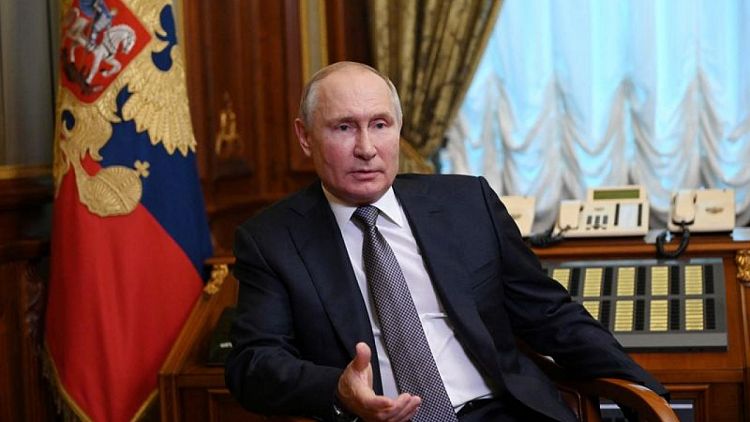By Mark Trevelyan
- Ukraine has become the main flashpoint in Moscow's relations with the West, with Russian troops massed near its border and NATO's forces on standby in case Russia attacks its neighbour.
Here are some of the reasons why Russian President Vladimir Putin is so preoccupied with Ukraine and why he has chosen to bring the crisis to a head now.
RUSSIA VS THE WEST
Since the Cold War ended, NATO has expanded eastwards by taking in 14 new countries, including the states of the former Warsaw Pact and the three Baltic nations that were once in the Soviet Union. Russia saw this as a threatening encroachment towards its borders and continues to say it was a betrayal of Western promises at the start of the 1990s - something the United States and its allies deny.
Ukraine is not a NATO member but has a promise dating from 2008 that it will eventually get to join. Since toppling a pro-Russian president in 2014, it has become closer politically to the West, staged joint military exercises with NATO and taken delivery of weapons including U.S. Javelin anti-tank missiles and Turkish drones. Kyiv and Washington see these as legitimate moves to bolster Ukraine's defence after Russia seized the Crimea region in 2014 and provided backing to separatists who are still fighting government forces in eastern Ukraine. Putin says Ukraine's growing ties with the alliance could make it a launchpad for NATO missiles targeted at Russia. He says Russia needs to lay down "red lines" to prevent that.
Russia rejects Ukrainian and U.S. suspicions it may be preparing an invasion of Ukraine, saying it is responding to threats and provocations. It wants security guarantees from the West including the rescinding of NATO's membership promise to Kyiv - something Washington has called a non-starter.
GEOGRAPHY AND RESOURCES
Ukraine is the second biggest country in Europe after Russia itself, has major ports on the Black Sea and shares borders with four NATO countries. It is a major exporter of corn and wheat. Europe depends on Russia for about one third of its natural gas - providing leverage for Putin in any dispute with the West - and one of the main pipelines passes through Ukraine. Controlling the Ukrainian territory that it crosses would enhance Russia's pipeline security and protect its ability to "weaponise" energy supplies. Most analysts, though, consider it unlikely that Russia would attempt to seize and defend large swathes of Ukrainian territory because the military cost would be too high.
HISTORY
With the 1991 break-up of the Soviet Union, Russia lost control of 14 former republics it had previously dominated, but the loss of Ukraine was the most painful. The two had been linked since the 9th century when Kyiv became the capital of the ancient state of Rus; in 988 its ruler, Grand Prince Vladimir, introduced Orthodox Christianity. From 1654, Russia and Ukraine were united by treaty under the rule of the Russian tsar.
The two countries speak closely related languages and later formed, with Belarus, the Slav core of the Soviet Union. Many Russians feel a connection with Ukraine that they do not feel with other former Soviet republics in the Baltics, Caucasus and Central Asia.
Putin alluded to this in a long essay in June 2021 in which he said Russians and Ukrainians were one people who shared a single "historic and spiritual space" and that the emergence of a "wall" between them in recent years was tragic. Kyiv rejected his argument as a politically motivated and over-simplified version of history.
PUTIN'S MINDSET AND MOTIVES
Putin, who once called the break-up of the Soviet Union the greatest geopolitical catastrophe of the last century, has devoted his presidency to restoring Moscow's influence throughout the post-Soviet space, defying the West and trying to reassert Russia as a global power.
Keeping the world guessing about a possible invasion of Ukraine is consistent with those aims. It has forced Russia's security demands to the top of the international agenda and compelled U.S. President Joe Biden to re-engage with Putin, although it has also drawn Western warnings of drastic international sanctions.
Putin's impassioned public statements on Ukraine suggest his actions are driven by personal conviction as well as politics. Events there have defined the lows and highs of his rule - pro-Western revolutions in 2004 and 2014 dealt blows to Russian interests, but Putin presented the seizure of Crimea as a historic victory. After 22 years as Russia's paramount leader, some analysts believe he may be pondering his own legacy and looking to complete unfinished business in Ukraine by blocking its westward shift and reclaiming it as part of a Russian sphere of influence - something that Ukraine, NATO and the United States all say they will never accept.
